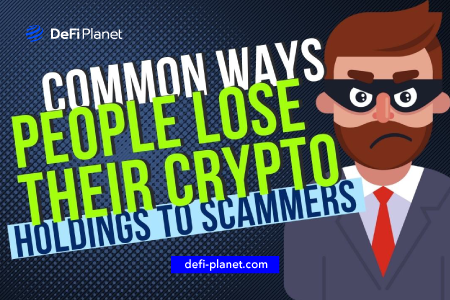Last updated on March 4th, 2025 at 06:58 am
With the increasing value of cryptocurrencies, scammers are consistently exploring new ways to defraud crypto enthusiasts of their assets. New tricks are invented regularly, while old strategies evolve. Despite the fact that certain governments have started to implement legislation and guidelines governing the use of cryptocurrencies in their respective regions, as well as penalizing those who are found wanting, the crypto space remains a grey area.
This post comprehensively examines some of the most common tactics used by scammers to defraud users of their tokens.
What Is a Crypto Scam?
A crypto scam is an umbrella term for the various methods that unscrupulous elements employ to defraud people of their cryptocurrencies. To safeguard their assets, the average crypto enthusiast must be alert to certain activities.
Regulatory agencies such as the United States Securities and Exchange Commission (SEC) have actively penalized and prosecuted fraudulent cryptocurrency operations that have diverted people’s assets. For example, the US Securities and Exchange Commission (SEC) sued the founders of Bitconnect, a global lending platform, for participating in a $2 billion fraud.
It “filed in the United States District Court for the Southern District of New York, from early 2017 through January 2018, Defendants conducted a fraudulent and unregistered offering and sale of securities in the form of investments in a “Lending Program” offered by BitConnect. The complaint alleges that, to induce investors to deposit funds into the purported Lending Program.”
Despite the fact that the US SEC and other regulatory agencies both within and outside the US are working hard to rid the crypto ecosystem of fraudsters, it is imperative that users are adequately informed about the most prevalent crypto scams.
Common Crypto Scams
There are several scam tactics that users may encounter while navigating the crypto space, some of which are discussed below.
Ponzi Schemes
The Ponzi scheme is named after Charles Ponzi, a man who pulled off one of the greatest scam schemes of his time. In the 1920s, his venture was well-known in the United States as he amassed a large sum of money from individuals and offered high returns. When it went bust, that type of scam was named after him.
Ponzi schemes, as earlier stated, are not new; they have existed for quite some time. Typically, the scammer lures victims with the promise of high returns and then disappears with the funds.
This is a regular occurrence in the crypto space, as history is replete with stories of people losing money to Ponzi platforms posing as crypto ecosystems. Swiss coin is a superb illustration of a Ponzi scheme.
Swiss coin commenced operations during a period when several crypto projects were organizing Initial Coin Offerings (ICOs). It promised to be a blockchain platform that would provide huge returns. According to an analysis of the platform by Bitcoin.com,
“Swisscoin shows no signs of being an actual cryptocurrency. The operating system looks like a clone of the NXT dashboard offering a holding tank for token packages. There is no blockchain explorer, and Swisscoin is not listed on market capitalization sites such as Coinmarketcap.com. The Swisscoin ‘whitepaper’ says a source code repository, and a blockchain explorer are “coming soon.” The organization offers a screenshot of a blockchain explorer instead.”
Detecting a Ponzi scheme is quite simple, especially if the user knows what to look out for. This type of scam typically lacks blockchain infrastructure, offers large profits, offers referral bonuses to users, and has no use cases.
Fake Exchanges
Scammers also utilize fake exchanges to defraud customers of their crypto assets.
In most cases, the fake crypto exchange organizes media rounds and marketing campaigns on popular social media platforms in the hopes of convincing people to sign up. They may offer enticing incentives to individuals who sign up and refer others.
The catch is that users must pay a fee before they can gain access to the incredible features that the fake crypto exchange offers.
Sometimes the fake exchange may not request an upfront fee but could confiscate the cryptocurrency sent to it for rather frivolous reasons.
It is best to conduct adequate due diligence before using a crypto exchange to swap tokens. When a decentralized exchange, particularly an Automated Market Maker, is launched, it offers lucrative rewards to individuals who provide liquidity in the pool.
Fake Social Media Accounts
Crypto enthusiasts tend to follow leaders in the blockchain space in droves because of their in-depth knowledge of the space. Some people rely on these figures for investment advice and other purposes.
In some cases, these popular accounts may promote different projects they believe have a good chance of success. Scammers often take advantage of this by cloning the accounts of popular names in the crypto space.
They often gain followers by populating their list with bots that follow them to appear authentic. These fake accounts may subsequently disseminate cryptocurrency offers to their followers, and an unsuspecting individual may fall for them.
Another type of social media scam involves hacking verified accounts of prominent personalities in the space and posting about a fraudulent crypto offer. In 2020, the verified accounts of prominent persons, such as Barack Obama, got hacked. The hacker claimed in a post that they would double any sum sent to a crypto wallet address. It went on to say that if a user sent $1,000, they would receive $2000 in return.
The accounts of Joe Biden, Elon Musk, Kanye West, and Jeff Bezos were also targeted during the attack.
Fraudulent Press Releases
When crypto projects achieve milestones, they usually issue press releases on their blogs and news outlets. Depending on how massive the news is, it may be broadcasted on the pages of other crypto news websites.
Scammers may take advantage of this at times. They may claim that a well-known company wants to invest in a crypto project to artificially increase the market value of the underlying tokens. Once the value of the tokens increases, they sell large amounts to buyers before the public realizes that the news was fake. When the general public eventually discovers that the news was fabricated, the value of the coins plummets drastically.
A similar incident occurred when a fake Press Release was published and circulated across several crypto news platforms, claiming that Kroger, one of the world’s largest grocery stores, was accepting Bitcoin Cash. The grocery store instantly denied the news. No one knows for sure what the fake Press Release was intended to accomplish.
Scamming Emails
Scammers have mastered the art of duplicating the emails of legitimate crypto platforms such as exchanges. They examine the structure of the emails and replicate them in such a way that an undiscerning eye may fall victim. Except for the email address that sent it, this type of correspondence may end up being overly detailed. Sometimes the email address appears identical, misspelling a letter that may be difficult to see.
Even if an email appears authentic, it is best to double-check. Given how quickly news travels in the crypto space, it’s important to keep an eye on popular social media platforms for email-related updates.
For example, when a group of scammers sent phishing emails to people pretending to be OpenSea, word circulated quickly on Twitter. Several individuals shared the fake emails they received, while others admitted to falling for it.
OpenSea initially stated that 32 people had been affected, but later reduced the number to seventeen, claiming that 15 users had interacted with the scammers but did not lose their tokens.
According to Peckshield, 254 tokens were stolen, including Decentraland and Bored Ape Yacht Club NFTs.
In Conclusion,
- Because blockchain transactions are final, it is prudent to handle tokens with caution. A transaction cannot be reversed once it has been completed.
- Scammers utilize a variety of techniques to defraud individuals of their cryptocurrency.
- Always conduct due diligence before making any decision, regardless of whether the information was published by a reliable source.
If you would like to read more articles like this, follow DeFi Planet on Twitter, LinkedIn, Instagram and Facebook.





















